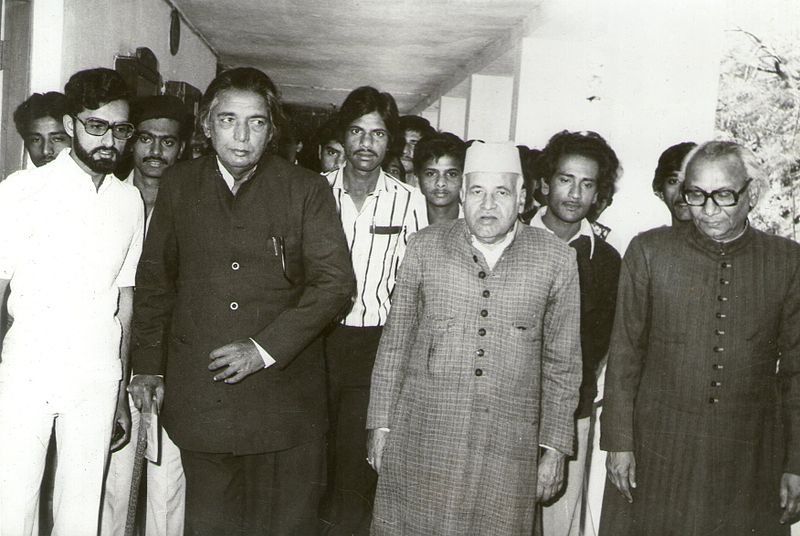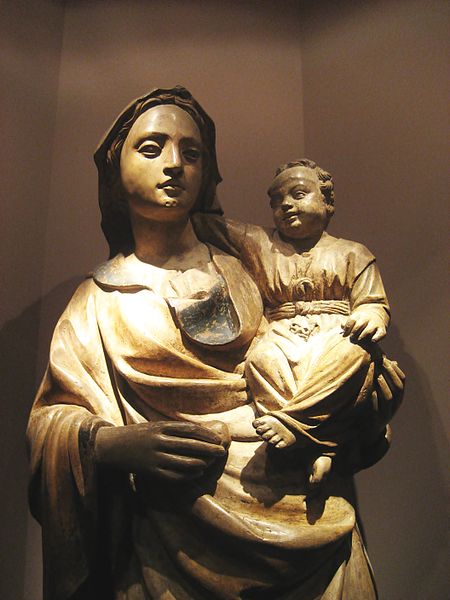Kaifi Azmi’s “The Son of Mary”/”کیفی اعظمی کی “ابنِ مریم Posted by Rachael on Mar 21, 2018 in Uncategorized
This week, let’s return to another of the unforgettable poet and lyricist, Kaifi Azmi’s, poems. Similar to “Daera/The Circle” (دائره), Azmi uses his knowledge of diverse belief systems and cultures to enrich his verse and complicate his philosophical stance. This quality of Azmi’s poetry, in addition to his seemingly simple, yet at times abstruse and complex verse, makes this poet stand out amongst writers the world over. In this particular poem, notice Azmi’s at times irregular and seemingly casual syntax, his use of repetition and lists and bare yet meticulous and enigmatic verse that is rife with double meanings.
The Son of Mary
ابنِ مریم
|
Urdu Text |
Roman Transliteration |
English Translation |
تم خدا ہو |
Tum khudaa ho |
You are God |
خدا کے بیٹے ہو |
Khudaa ke bete ho |
You are the son of God |
یا فقط امن کے پیمبر ہو |
Ya faqat aman ke payambar ho |
Or perhaps you are simply a messenger (prophet)* of peace |
یا کسی کا حسیں تخیل ہو |
Ya kisee ka haseen takhayyul ho |
Or the beautiful figment of someone’s imagination |
جو بھی ہو مجھ کو اچھے لگتے ہو |
Jo bhi ho mujh ko acche lagte ho |
Whatever you are, I like you |
مجھ کو سچے لگتے ہو |
Mujh ko sacche lagte ho | You seem true to me |
اس ستارے میں جس میں صدیوں کے |
Us sitaare me jis me sadiyon ke | On that star where, for centuries… |
جھوٹ اور کذب کا اںدھیرا ہے |
Jhoot aur kizb kaa andheraa hai | The darkness of lies and deceit has endured |
اس ستارے میں جس کو ہر رخ سے |
Us sitaare me jis ko har rukh se | On that star, where |
ریںگتی سرحدوں نے گھیرا ہے |
Rengti sarhadon ne gheraa hai | Slithering borders have encroached in every direction |
اس ستارے میں جس کی آبادی |
Us sitaare me jis ki aabaadi | On that star, whose people |
امن بوتی ہے جنگ کاٹتی ہے |
Aman boti hai jang kaatti hai | Sow peace and reap war |
رات پیتی ہے نور مکھڈوں کا |
Raat peetee hai noor mukhdon ka | The night imbibes radiant facades |
صبح سینوں کا خون چاٹتی ہے |
Subah seenon kaa khoon chaatati hai | And the morning laps the blood of wounded breasts |
تم نہ ہوتے تو جانے کیا ہوتا |
Tum na hote to jaane kyaa hotaa | If it weren’t for you, who knows what would be |
تم نہ ہوتے تو اس ستارے میں |
Tum na hote to us sitaare me | If it weren’t for you, then, on that star… |
دیوتا راکشش غلام امام |
Devtaa, raakhshash, ghulaam, imam | Gods, demons, slaves, holy men* |
پارسا رںد راہ بر رہزن |
Paarsaa, rind, raah-bar, rehzan | Saints, drunkards, guides, thieves |
برہمن شیخ پادری بھکشو |
Barhaman, shaikh, paadri, bhikshoo | Brahmins, preachers, monks, priests |
سبھی ہوتے مگر ہمارے لئے |
Sabhi hote magar humaare liye | All would be, but for us |
کون چڈھتا خوشی سے سولی پر |
Kaun charhtaa khooshi se sooli par | After all, who ascends the gallows gladly?
(line break) |
جھوںپڈوں میں گھرا یہ ویرانہ |
Jhonpadon me ghiraa ye veeraanaa | This wasteland, encircled by huts |
مچھلیاں دن میں سوکھتی ہیں جہاں |
Machhliyaan din me sookhti hain jahaan | Where cats sit far away |
بلّیاں دور بیٹی رہتی ہیں |
Billiyan door baithi rehti hain | Fish shrivel in the sun (this and line above it are switched) |
اور خارش_زدہ سے کچھ کتّے |
Aur khaarish-zadaa se kuch kutte | And dogs, plagued by mange, |
لیٹے رہتے ہیں بے_نیازانہ |
Lete rahte hain be-niyaazaana | Lie about, indifferent, |
دم مروڑے کہ کویٴ سر کچلے |
Dum marode ki koi sar kuchle | Tails twisted, tempting fate to crush their skulls |
کاٹنا کیا وہ بھوںکتے بھی نہیں |
Katnaa kyaa voh bhunkte bhi nahin | Why bite–when they don’t even bark
(line break) |
اور جب وہ دہکتا انگارہ |
Aur jab voh dehektaa angaara | And when that burning ember |
چھن سے ساگر میں ڈوب جاتا ہے |
Chhan se saagar me doob jaataa hai | Drowns in the ocean with a hiss |
تیرگی اوڈھ لیتی ہے دنیا |
Teergi ordh leti hai duniya | Darkness envelops the world |
کشتیاں کچھ کنارے آتی ہیں |
Kashtiyaan kuch kinaare aati hain | Boats travel to certain shores |
بھنگ گاںجا چرس شراب افیون |
Bhang, gaanjaa, charas, sharaab, afyoon | Opium, marijuana, hemp, alcohol* |
جو بھی لایںٴ جہاں سے بھی لایںٴ |
Jo bhi laayen, jahaan se bhi laayen | Whatever they bring, wherever they bring it from |
دوڑتے ہیں ادھر سے کچھ ساےٴ |
Daurhte hain idhar se kuch saayen | Shadows run from here |
اور سب کچھ اتار لاتے ہیں |
Aur sab kuch utaar laate hain | And set everything down |
گاڑی جاتی ہے عدل کی میزان |
Gaadi jaati hai adl ki meezaan | Machines drive the balance of justice |
جس کا حصہ اسی کو ملتا ہے |
Jis kaa hissa usi ko miltaa hai | Each shall receive his rightful share |
یہاں خطرہ نہیں خیانت کا |
Yahaan khatra nahin khayaanat kaa | Thus, there is no danger of dishonesty |
*”Payambar/پیمبر” can mean both “messenger” and “prophet” (as in a title of Muhammad, the prophet of Allah). In some ways, the two terms overlap in that Muhammad, the prophet, was a messenger of God in the sense that he reported his visions of Allah to people unaware of him and thus initiated the religion of Islam. Here, of course, Azmi is referring to the “son of Mary” or Jesus, who is also considered a prophet and a messenger sent from God, his father.
*”Imaam/امام” is a bit difficult to translate into English without just keeping the original Arabic. This is a term for a religious leader and priest of a mosque.
*The terms for different types of drugs here do not all have tidy English equivalents. “Bhang/بھنگ” is a term for hemp that is often made into a drink from the plant’s leaves. “Charas/چرس” is a resinous concoction made from hemp or cannabis, “Ganja/گاںجا” refers to hemp leaves and their preparation when smoked and “Afyoon/افیون” refers to opium.

Build vocabulary, practice pronunciation, and more with Transparent Language Online. Available anytime, anywhere, on any device.





